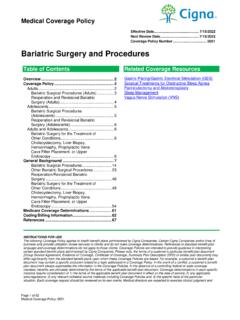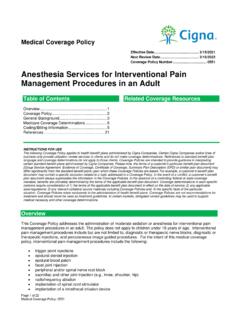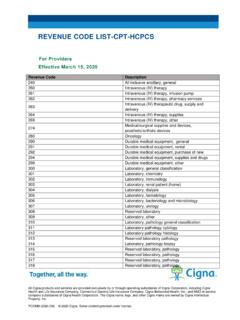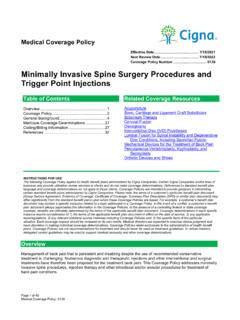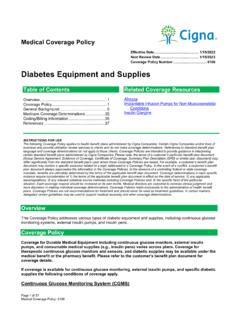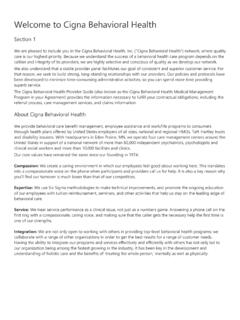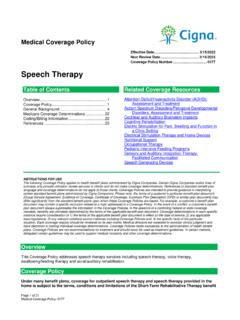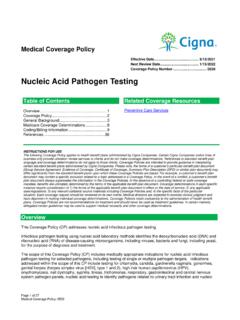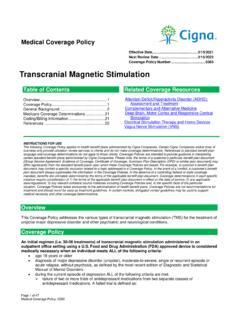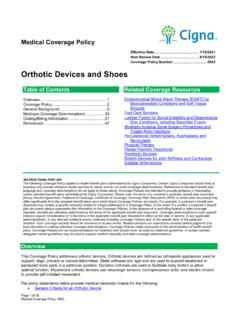Transcription of Molecular Diagnostic Testing for Hematology and Oncology ...
1 Medical Coverage Policy Page 1 of 59 Medical Coverage Policy: 0520 Effective 8/15/2022 Next Review Date .. 2/15/2023 Coverage Policy Number .. 0520 Molecular Diagnostic Testing for Hematology and Oncology Indications Table of Contents Overview .. 2 Coverage Policy .. 2 General Criteria for Somatic Pathogenic or Likely Pathogenic Variant Genetic Testing .. 2 Tumor Profile/Gene Expression Classifier Testing .. 4 Screening and Prognostic Tests for Early detection of Prostate Cancer .. 6 Tumor Tissue-Based Molecular Assays for detection of Prostate Cancer .. 7 Hematologic Cancer and Myeloproliferative and Myelodysplastic Disease .. 8 Occult Neoplasms .. 9 Other Tumor Profile Testing .. 9 General Background .. 10 General Criteria for Somatic mutation Genetic Testing .. 10 Tumor Profile/Gene Expression Classifier Testing .. 11 Screening and Prognostic Tests for Early detection of Prostate Cancer.
2 19 Tumor Tissue-Based Molecular Assays for detection of Prostate Cancer .. 21 Hematologic Cancer and Myeloproliferative and Myelodysplastic Disease .. 22 Occult Neoplasms .. 24 Other Tumor Profile Testing .. 25 Topographic Genotyping .. 25 Medicare Coverage Determinations .. 26 Appendix A .. 26 Coding Information .. 30 References .. 42 Related Coverage Resources Genetics Genetic Testing Collateral File INSTRUCTIONS FOR USE The following Coverage Policy applies to health benefit plans administered by Cigna Companies. Certain Cigna Companies and/or lines of business only provide utilization review services to clients and do not make coverage determinations. References to standard benefit plan language and coverage determinations do not apply to those clients. Coverage Policies are intended to provide guidance in interpreting certain standard benefit plans administered by Cigna Companies.
3 Please note, the terms of a customer s particular benefit plan document [Group Service Agreement, Evidence of Coverage, Certificate of Coverage, Summary Plan Description (SPD) or similar plan document] may Page 2 of 59 Medical Coverage Policy: 0520 differ significantly from the standard benefit plans upon which these Coverage Policies are based. For example, a customer s benefit plan document may contain a specific exclusion related to a topic addressed in a Coverage Policy. In the event of a conflict, a customer s benefit plan document always supersedes the information in the Coverage Policies. In the absence of a controlling federal or state coverage mandate, benefits are ultimately determined by the terms of the applicable benefit plan document. Coverage determinations in each specific instance require consideration of 1) the terms of the applicable benefit plan document in effect on the date of service; 2) any applicable laws/regulations; 3) any relevant collateral source materials including Coverage Policies and; 4) the specific facts of the particular situation.
4 Each coverage request should be reviewed on its own merits. Medical directors are expected to exercise clinical judgment and have discretion in making individual coverage determinations. Coverage Policies relate exclusively to the administration of health benefit plans. Coverage Policies are not recommendations for treatment and should never be used as treatment guidelines. In certain markets, delegated vendor guidelines may be used to support medical necessity and other coverage determinations. Overview This Coverage Policy addresses Molecular Diagnostic Testing for somatic pathogenic and likely pathogenic variants for selected Hematology and Oncology indications. Somatic variants are changes in the DNA of cells that are not inherited or passed down by blood relatives. They may occur in any cell of the body except the germ cells ( , egg and sperm).
5 Test methods discussed in the scope of this Coverage Policy include single variant analysis, broad Molecular profiles ( , next generation sequencing) and gene expression classifier assays. These tests are used to identify disease-causing somatic mutations and the biological activity of genes originating in a tumor or hematologic malignancies and can aid in determining the extent or stage of disease, probability of recurrence, appropriate treatment options and how well the disease may respond to treatment in certain clinical scenarios. Coverage Policy Many benefit plans limit coverage of genetic Testing and genetic counseling services. Please refer to the applicable benefit plan language to determine benefit availability and terms, conditions and limitations of coverage for the services discussed in this Coverage Policy. For additional information regarding coverage for specific genetic tests please refer to the Genetic Testing Collateral: Molecular Tests and Biomarkers.
6 General Criteria for Somatic Pathogenic or Likely Pathogenic Variant Genetic Testing Medically Necessary A tissue-based Molecular tumor biomarker, broad Molecular profile panel or gene expression classifier (GEC) Testing is considered medically necessary when ALL of the following criteria are met: the individual is a candidate for a targeted therapy associated with a specific tumor biomarker(s) or disease site results of Testing will directly impact clinical decision making the Testing method is considered to be scientifically valid and proven to have clinical utility based on prospective evidence no other tumor biomarker, broad Molecular profile panel or gene expression classifier test has been performed on this tumor sample for the same indication ANY of the following: indentification of the specific biomarker or risk assessment using a GEC has been validated by the National Comprehensive Cancer Network (NCCN Guidelines ) as a category 1, 2A or 2B recommendation for the individual s tumor type of disease Page 3 of 59 Medical Coverage Policy: 0520 identification of the specific biomarker or use of a GEC has been demonstrated in published peer-reviewed literature to improve diagnosis, management or clinical outcomes for the individual s condition being addressed biomarker confirmation is required by a US Federal Drug Administration (FDA)-approved or cleared test as described within the section heading Indications and Usage of the FDA-approved prescribing label prior to initiating therapy broad Molecular profile panel Testing for EITHER of the following.
7 O advanced, metastatic solid tumors o ANY of the following hematologic malignancies: acute myeloid leukemia myelodysplastic disease myeloproliferative disease multiple myeloma systemic mastocytosis Targeted somatic Testing for PIK3CA is considered medically necessary when the following criteria are met: Post-menopausal female or male with advanced or metastatic, ER/PR positive and HER2 negative breast cancer Patient has progressed on endocrine therapy Targeted Molecular Testing for NTRK fusions (NTRK1/2/3 fusions) is considered medically necessary when the individual has a solid tumor known to respond to treatment with an FDA approved drug therapy targeting NTRK gene fusions. Liquid biopsy by cell-free DNA laboratory Testing methods ( , cDNA, ctDNA) is considered medically necessary when tissue Testing is not available or contraindicated for EITHER of the following: advanced or metastatic solid tumors biomarker confirmation is required by an FDA-approved or cleared test as described within the section heading Indications and Usage of the US FDA-a pproved prescribing label prior to initiating therapy Testing of bone marrow samples for minimal residual disease (MRD) using high-throughput immunosequencing ( , Clonoseq) is considered medically necessary for ANY of the following indications or when designated by NCCN as a category 1, 2A or 2B recommendation.
8 Multiple myeloma (MM) B-cell acute lymphoblastic leukemia (ALL) chronic lymphoblastic leukemia (CLL) peripheral and cutaneous T-cell lymphoma (TCL) Other Testing ( , non-high-throughput immunosequencing) for MRD using a validated technology when recommended by NCCN Guidelines as a Category 1, 2A, or 2B recommendation is considered medically necessary. Not Medically Necessary Page 4 of 59 Medical Coverage Policy: 0520 Molecular Testing for Hematology and Oncology indications is considered not medically necessary if the criteria described above are not met. ---------------------------------------- ---------------------------------------- ---------------------------------------- ----------------------------- Tumor Profile/Gene Expression Classifier Testing Medically Necessary Gene expression classifier Testing (GEC) is considered medically necessary when ALL of the following criteria are met: individual is a candidate for chemotherapy ( , chemotherapy not excluded due to other factors) adjuvant chemotherapy is being considered in a woman and this Testing is being ordered to assess recurrence risk no other GEC has been performed on this tumor sample for the same indication and the associated criteria are met for ANY of the following indications.
9 Test Name Cancer Type and Indication MammaPrint 70-Gene Breast Cancer Recurrence Assay (CPTcode 81521) For a woman with anatomic stage I or stage 2 invasive breast cancer when ALL of the following criteria are met: histologic type is ductal, lobular, mixed (ductal/lobular), or metaplastic high clinical risk of recurrence* estrogen receptor (ER)-positive/progesterone receptor (PR)-positive human epidermal growth factor receptor 2 (HER2)-negative up to three positive node Tumor Grade Nodes Tumor Size Well differentiated None cm 1-3 cm Moderately differentiated None cm 1-3 Any size Poorly differentiated or undifferentiated None cm 1-3 Any size Oncotype DX for Early-Stage, Invasive Breast Cancer Assay (CPT code 81519) For recently diagnosed anatomic stage 1 or stage 2 infiltrating breast cancer when ALL of the following criteria are met.
10 Histologic type is ductal, lobular, mixed (ductal/lobular), or metaplastic tumor size and intermediate or high grade (Grade 2 or 3) OR tumor size cm any grade estrogen receptor positive and/or progesterone receptor positive HER2 receptor negative No evidence of distant metastasis EITHER of the following criteria: axillary node status is negative (micrometastasis is no greater than millimeters) whether the woman is pre- or post-menopausal up to three positive axillary nodes in a post-menopausal woman Prosigna Breast Cancer Prognostic Gene Signature Assay For recently diagnosed anatomic stage 1 or stage 2 breast cancer breast cancer when ALL of the following criteria are met: histologic type is ductal, lobular, mixed (ductal/lobular), or metaplastic Page 5 of 59 Medical Coverage Policy: 0520 Breast Cancer Index (BCI) Risk of Recurrence and Extended Endocrine Benefit Test (CPT code 81518) is considered medically necessary for a woman with early stage T1-T3 breast cancer diagnosed within the last five years when ALL of the following criteria are met: estrogen receptor (ER) positive human epidermal growth factor receptor 2 (HER2) negative no evidence of distant metastasis EITHER of the following.
